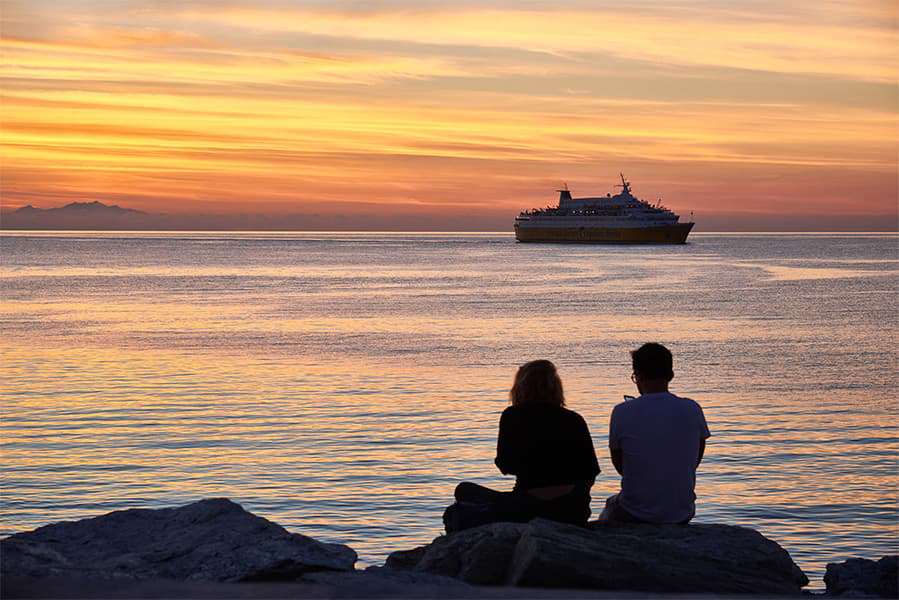Cies Islands – Vigo
Ferry to Spain
Cies Islands – Vigo
Ferry to Spain

Depending on the season their are usually 6 daily and 37 weekly sailings between Cies Islands and Vigo. 2 ferry operators provide the ferries from Cies Islands to Vigo, Naviera Nabia & Mar de Ons. Cies Islands Vigo ferries take around 45 minutes. The ferry costs between $52.35 and $192.79, depending on ticket details. Prices exclude any service fees. Ferry timetables change seasonally, use our Deal Finder to get live pricing and availability for ferries from Cies Islands to Vigo.
The earliest Cies Islands Vigo ferry typically departs Cies Islands at about 11:00 and the last ferry usually leaves at 20:00.
Ferries from Cies Islands to Vigo sail in around 45 minutes. Ferry duration can vary by ferry provider and can be impacted by weather conditions.
There is 37 weekly sailings from Cies Islands to Vigo provided by Naviera Nabia & Mar de Ons. Timetables can change from season to season.
Naviera Nabia provide 19 sailings weekly. Mar de Ons provide 20 sailings weekly.
The price of a ferry from Cies Islands to Vigo typically range between $52.35* and $192.79*. On average the Cies Islands Vigo ferry is $97.53*. The cheapest Cies Islands Vigo ferry prices start from $52.35*. The average price for a foot passenger is $97.53*.
Pricing will vary depending on number of passengers, vehicle type, route and sailing times. Pricing is taken from searches over last 30 days and exclusive of service fees, last updated 1 April 2025.
The distance between Cies Islands to Vigo is approximately 12 miles (19km) or 10 nautical miles.
Unfortunately, cars are not allowed to travel on ferries between Cies Islands and Vigo.
Naviera Nabia & Mar de Ons allow foot passengers on Cies Islands Vigo ferries.
Currently, are not permitted to board ferries from Cies Islands to Vigo.
More routes than anyone else.

Compare fares, times & routes in one place.
Change plans easily with flexi tickets.

Book e-tickets & manage trips in-app.
Live ship tracking & real-time updates.

Top-rated customer support when you need it.
The Cies Islands archipelago is formed of three islands found near the mouth of the Ria de Vigo estuary that cuts along the southern coast of the Iberian Peninsula in northern Spain. These mountainous islands are largely uninhabited and have been protected as a nature reserve since the 1980’s. As such, the sweeping verdant hills and rocky cliff-side coasts remain largely untouched by human activity.
What’s there to do on the Cies Islands?
The beaches that line the glistening blue shores are particularly popular during the warm summer months. The long, curving Rodas beach, that connects the islands of Monteagudo and Faro, was voted the best beach in the world by The Guardian newspaper in 2007. Make sure you take your own garbage bag as you must take your litter back to the mainland as big fines are imposed in this National Park and nature reserve. This pre-Roman settlement is a clean haven that’s perfect for relaxing, hiking or maybe even some bird watching.
How should I get around the island?
The port of the Cies Islands is nothing but a single concrete pier built upon the rocks that line the eastern coast of the isle of San Martino. There are no roads on the island meaning that travelling to and from the port can only be achieved by traversing the footpaths that lead towards the inland wilds of shrubs and trees that rise and fall over the hilly terrain.
What services are operated from the islands?
Two passenger services currently operate from the port, heading along three different routes. Both Naviera Nabia and Mar de Ons ferries offer daily trips east along the nearby Ria de Vigo to the cities of Vigo and Cangas that sit opposite each other across the water. Both services also sail the short distance south to the picturesque town of Baiona
Vigo, a lively port city in northwest Spain, is the gateway to and from the idyllic Cies Islands found just offshore in the North Atlantic. Ferry routes from the archipelago run multiple times a day, lasting approximately 40-45 minutes, offering sun-drenched coastal views along the way.
Possessing the largest fishing fleet in Europe is just one facet of Vigo’s colourful character; it’s steeped in medieval history with networks of intriguing alleyways to explore, as well as an excellent choice of authentic tapas bars, restaurants and buzzing nightclubs.
Found directly south of the Old Town, known locally as Casco Vello, is the Parque do Castro, a lush area populated by nearly 100 camellia trees, also boasting hilltop views from the area’s namesake castle, constructed by Felipe IV in the 17th Century.